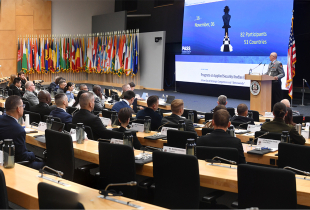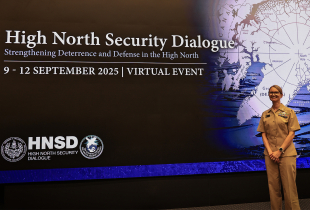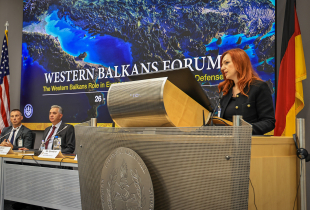
Cooperation or Confrontation in the European High North?
There is no doubt that the old adage ‘High North, Low Tension’ is becoming outdated in a region that is increasingly witnessing militarization and strategic competition. Rising levels of commercial and military activity are intersecting with geopolitical, climate, economic, and security trends, portending emerging challenges for a region that has largely experienced cooperation for decades. The George C. Marshall European Center for Security Studies recently hosted the fourth European Security Seminar – North (ESS-N) program, bringing together more than 50 speakers and participants representing 13 nations – including all eight Arctic states – for discussions around the central theme of cooperation or conflict. Throughout the week, regional security professionals, scholars, and policymakers examined the security challenges and future prospects of the region. Evaluating the potential for cooperation or conflict in the European High North, the seminar focused on geostrategic competition in the region, with a particular emphasis on the dangers of an emerging Arctic security dilemma on NATO’s Northern Flank. This year’s ESS-N offered security assessments and policy recommendations for improving regional cooperation and reducing tensions. There is no doubt that the European High North is changing and it is clear that key stakeholders in the region must act in order to ensure tensions in the region remain low.
About the Authors
CDR Rachael Gosnell is a doctoral candidate in International Security and Economic Policy at the University of Maryland, with a focus on Arctic security. She holds a MA in International Security Studies from Georgetown University, a Masters in Engineering Management from Old Dominion University, and a Bachelor of Science in Political Science from the U.S. Naval Academy.
Dr. Katrin Bastian is a Lecturer of Security Studies at the George C. Marshall European Center for Security Studies. Before joining the GCMC in autumn 2020, Dr. Bastian worked as the personal adviser to the Ambassador of the Principality of Liechtenstein in Berlin. During her sixteen years of service at the embassy, she also worked as lecturer of international relations and EU foreign policy at Humboldt University Berlin (2005-2008) and at the University of California at Berkeley (2009).
For Academic Citation
Rachael Gosnell and Katrin Bastian, “Cooperation or Confrontation in the European High North?” Marshall Center Security Insights, no. 70 (November 2021): https://www.marshallcenter.org/en/publications/security-insights/cooperation-or-confrontation-european-high-north-0.
The George C. Marshall European Center for Security Studies
The George C. Marshall European Center for Security Studies in Garmisch-Partenkirchen, Germany, a German-American partnership, is committed to creating and enhancing worldwide networks to address global and regional security challenges. The Marshall Center offers fifteen resident programs designed to promote peaceful, whole of government approaches to address today’s most pressing security challenges. Since its creation in 1992, the Marshall Center’s alumni network has grown to include over 14,400 professionals from 157 countries. More information on the Marshall Center can be found online at www.marshallcenter.org.
The articles in the Security Insights series reflect the views of the authors and are not necessarily the official policy of the United States, Germany, or any other governments.


